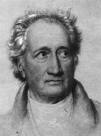Jonathan Derbyshire has a nice piece in the New Statesman on the growing dominance of anglophone writers in the global literary marketplace. But part of his argument is based on a misreading of Goethe and the concept of Weltliteratur (literally "world literature").
however […] And it is that Goethe reserves a special role for one
national literature in particular: Germany's. He wrote that it was the
"destiny" of the German language to become the "representative of all
the citizens of the world". With the centrality of translation to
German literary culture, anyone who knew the language well enough
wouldn't have to go to the trouble of learning Greek or Latin or
Italian; they could read Homer, Virgil or Dante in German translations
that were more than a match for the originals. Germany, therefore, was
the literary marketplace par excellence. And Weltliteratur,
it turned out, wasn't so much a matter of dissolving national
boundaries as a matter of a single national literature going global."
Goethe never systematically explained his concept of Weltliteratur, rather, his thoughts on the subject are scattered throughout letters and essays on other topics. But I don't believe he ever thought that the German language and German literature would dominate. At most, Germany would act as an honest broker of literary influence between other national literatures. In a letter to Sulpiz Boisserée Goethe wrote:
Ich bezwecke ein Höheres, worauf ich
vorläufig hindeuten will. Überall hört
liest man von dem Vorschreiten des Menschengeschlechts, von den weiteren
der Welt- und Menschenverhältnisse. Wie es auch im Ganzen hiemit
sein mag, welches zu untersuchen und näher zu bestimmen nicht meines
ist, will ich doch von meiner Seite meine Freunde aufmerksam machen, daß
überzeugt sei, es bilde sich eine allgemeine Weltliteratur, worin uns
Deutschen
An "honorable role" for Germans is different from the "destiny" for global dominance that Derbyshire asserts. Goethe lamented the fact that, unlike England and France, Germany lacked a cultural center. But Germany's fragmentation contributed to its receptivity to influences from other nations (such as the Shakespeare cult of the late 18th century). So Germany's "honorable role" was to act as a mediator (Vermittler) between cultures with the goal of estabilshing a true Weltliteratur. In a letter to Thomas Carlyle he wrote: Zu einer solchen Vermittlung und wechselseitigen Anerkennung tragen die Duetschen seit langer Zeit zu. (For a long time Germans have contributed to this mediation and mutual recognition). For Goethe, the translator plays a critical role in establishing a Weltliteratur (eines der wichtigsten und würdigsten Geschäfte in dem allgemeinen Weltverkehr).Luther represents the greatest example, since his translation of the Bible into vernacular German had a profound impact on Germany's linguistic and cultural development. And it is this absence of translation in the English-speaking cultural markets that prevents English-language writing from rising to the niveau of Weltliteratur as envisaged by Goethe. As Derbyshire points out in his article, one third of all fiction published in France is in translation, while in the US it is a mere Three Percent.



0 comment
However Goethe intended the meaning of Weltliteratur, there is a significant wrinkle in Derbyshire’s (no relation) logic. He writes:
‘You might say that today America (or the “Anglosphere”, if you want to include Britain) plays the role that Goethe once envisaged for Germany.’
Yet it plainly is not receptive to literature and debates originally in other languages, rendering Goethe’s whole point about providing access to other literatures dead in the water.